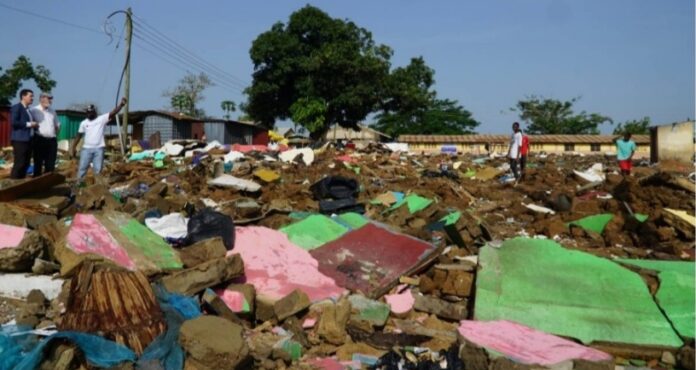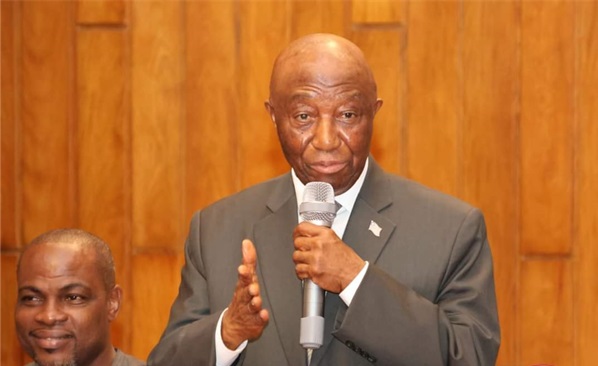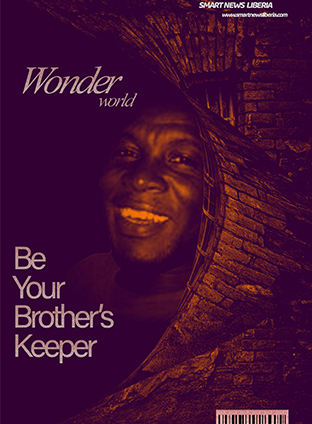GHANA – At four o’clock in the morning on February 27, people in the Buduburam refugee camp in Ghana were woken up from sleep by bulldozers. Suddenly, the Ghanaian government began demolishing large parts of the camp that morning. 15,000 people were directly affected and have since been seeking refuge in emergency accommodation in nearby churches and schools.
The refugee camp was set up in 1990 and mainly accommodates people from Liberia and (more recently) Burkina Faso who had fled to Ghana from civil war in their countries. Over the decades, tens of thousands of people have settled in Buduburam (which is about 1.5 hours west of the Ghanaian capital Accra and is also known as “Liberia Camp”). Estimates for the total number of people housed in the camp range between 45,000 and 60,000.
In mid-October 2022, the Chairman of the Ghana Refugee Board, Professor Kenneth Agyemang Attafuah, announced in Geneva at a meeting of the Executive Committee of the United Nations High Commissioner for Refugees (UNHCR) that the Ghanaian state would decommission the refugee camp in a “safe, humane and efficient manner consistent with domestic and international law and Ghana’s human rights obligations”. He spoke of both the repatriation of the Liberian refugees to their country of origin and the possibility of their integration into Ghanaian society. According to press reports1, Professor Attafuah declared in Geneva that Ghana remains committed to its obligation to protect the safety and dignity of refugees and asylum seekers in the country.
These words in Geneva sounded good, but February 27 speaks a different language. Using bulldozers to systematically and extensively destroy mud huts in which people in need find simple accommodation may be “efficient”. However, this approach can neither be described as “safe” nor as “humane”. The people of Buduburam are still waiting for an official explanation from the Ghanaian government as to what exactly happened on February 27 and why parts of the camp were suddenly destroyed in such a violent manner.
In Geneva, Professor Attafuah held out the prospect of the refugees receiving a so-called “Ghana Card”, a Ghanaian identity card. This enables full integration into Ghanaian society through work and income opportunities and also allows access to banking and financial services, social benefits (insurance and healthcare), tax payments and the possibility to apply for a driver’s license or get a SIM card. However, neither the coordinator of the Buduburam refugee camp, Dennis Gwion Dixon, nor George Bannerman, who has been coordinating humanitarian aid in the camp for many years, are aware of any refugees who have received such a Ghana Card to date.
The reality in the refugee camp is in stark contrast to the words of the Ghana Refugee Board Chairman, who had explained in Geneva:
“The Issuance of the Ghana Card to refugees is a major step aimed at guaranteeing social and financial inclusion for all refugees. Our policy is that whoever they are, wherever they come from, wherever they find themselves within Ghana and at whatever time, refugees must be able to access services at the same levels as their Ghanaian hosts.”
Professor Attafuah received much praise for this commitment, including from the United Nations High Commissioner for Refugees, Filippo Grandi, who expressed delight over the concept of including refugees in the acquisition of the Ghana Card and enabling them to access diverse facilities and services and described this approach as “extremely important”.
In the meantime, however, Liberian passports were issued for people from Liberia in the Buduburam refugee camp. During a personal visit on April 17, 2024, the President of the International Society for Human Rights (ISHR), Professor Thomas Schirrmacher, and ISHR Secretary General, Matthias K. Boehning, were shown passports of children, young adults and elderly people. A temporary residence permit from the Ghanaian state was pasted in all of them, which, however, contains the explicit note “No occupation or business for reward permitted” effectively ruling out any work or income opportunities in Ghana. Integration into Ghanaian society is therefore impossible for these people.
The Ghanaian government’s strategy therefore appears to be completely geared towards returning the refugees to Liberia. However, this fails to take into account the reality of the people’s lives in several respects. For one thing, many of the refugees have been living in Ghana for decades, if they were not even born in Ghana. This means that all their networks of family, friends and acquaintances, as well as all their know-how on how to cope with daily life, exist in Ghana and not in the potentially foreign country of Liberia. Secondly, the refugees receive neither financial nor administrative support if they are repatriated to Liberia, which makes successful integration into Liberian society and the Liberian labor market almost impossible. Both Dixon and Bannerman know stories of Liberian refugees who, after having been voluntarily repatriated to Liberia, returned to the Buduburam refugee camp in Ghana for the reasons mentioned.
If the plan preferred by the Ghanaian and Liberian governments to repatriate people to Liberia does not work, this may lead to annoying complications from a governmental and administrative point of view. However, under no circumstances do these justify seemingly “simple solutions” such as the destruction of the people’s meagre accommodation as happened on February 27. Such inhumane actions against the refugees only exacerbate their plight and potentially lead to disappointment, frustration and social tensions, which can quickly turn into violence.
The people in Buduburam refugee camp need real prospects for successful integration into the Ghanaian society. The Ghanaian government must follow up its words in Geneva with action. The ISHR will continue to work to ensure that the fate of the people in the Buduburam refugee camp is not forgotten and that real solutions are created. Meanwhile, the non-profit organization “Giving Hands”, which is a close cooperation partner of ISHR, continues to provide financial support to meet the basic needs of the people in Buduburam for food, water and medicine, as it has done for many years.
Matthias K. Boehning
ISHR Secretary General







